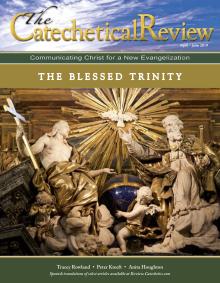A Gift from the Church for the Church What does the world need at this time? And what would help every single Catholic right now? The answer is held in this beautiful gem, the Catechism of the Catholic Church. The contents on each page of this “book” capture God’s profound love for us and his unwavering desire to be united with us in a relationship of love. Literally, we can find God in every paragraph! St. Paul tells us in his Letter to the Romans that we are to “be transformed by the renewal of [our] mind” (Rom 12:2). There are a vast number of excellent Catholic books that can be studied and put into practice that bring such renewal, but none compare to the richness of the Catechism of the Catholic Church. This is a bold statement but is based upon the testimony by Catholics at all levels of faith: from the person in the parish with no theological background to the scholarly intellectual with years of higher-level training. This life-saving treasure is worth reading in its entirety, as a systematic and orderly presentation of the “Sacred deposit” of the Faith.[1] We have been given a most incredible gift in the Catechism. This beautiful masterpiece is an orderly presentation of the faith—revealed Truth—that slowly builds in a manner in which all the teachings draw together and make sense. That is to say, there is a growing explanation of who God is, what he has done and continues to do for us, and our response to him through our choices in daily life and our relationship with him through prayer. And the presentation of doctrine throughout is clear and succinct. Beginning with the prologue, the first heading grabs our attention: “The life of man – to know and love God.” In order for us to know and love God, we must come to “the knowledge of the truth” (1Tim 2:3-4; emphasis mine), which is necessary for salvation. So, anything that is taught regarding the Faith must be correct in order to convey the truth! We have the guarantee that the teaching in the Catechism is correct. From the Church we receive the Truth revealed by God gathered together in the Catechism—the treasure of “Good News” given by Christ to the Apostles and handed on to us. Therefore, the Catechism allows every Catholic, and the world, to know exactly “what the Church professes, celebrates, lives and prays in her daily life.”[2] In Pope John Paul II’s Apostolic Constitution introducing the text of the Catechism, the first line captures the feelings of every person who has read any part of this “authoritative exposition of the one and perennial apostolic faith”: “It is a cause for great joy that the…Catechism…is being published.” In Chapter One of the Creed, I can remember finding peace in the depths of my soul when I read the following lines because I had lived in a place where I was not hearing the truth: …God is Truth itself, whose words cannot deceive. This is why one can abandon oneself in full trust to the truth and faithfulness of his word in all things…. God is also truthful when he reveals himself – the teaching that comes from God is “true instruction.” When he sends his Son into the world it will be ‘to bear witness to the truth’: “We know that the Son of God has come and has given us understanding, to know him who is true.” (CCC, pars. 215, 217, emphasis mine) We can rest assured that the Catechism contains the constant teaching of the Catholic Church. We can have a tremendous sense of security in knowing this is a reliable presentation of the truth. As Jesus said, “you will know the truth and the truth will set you free” (Jn 8:32). This truth not only brings intellectual freedom but also, even more comprehensively, provides emotional and spiritual freedom, which brings stability and peace. We don’t have to wonder; this does not involve guesswork; we don’t have to figure it out. God has revealed the truth and wants us to know and understand the truth and live it out by his grace, because it will provide personal happiness, not only now but for all eternity. The Catechism also contains a cohesive unity, in that it is composed of four interconnected parts, also called pillars: Creed, Sacraments, Life in Christ, and Prayer. What we believe in the Creed, we celebrate in the Sacraments. Our belief and celebration, in turn, shape and sustain how we live and pray. In other words, a doctrine in the Creed is directly related in some way to specific paragraphs in the sections on the Sacraments, Life in Christ, and Christian Prayer. And this is the case, back and forth, between all four pillars.
The rest of this online article is available for current Guild members.
This article is from The Catechetical Review (Online Edition ISSN 2379-6324) and may be copied for catechetical purposes only. It may not be reprinted in another published work without the permission of The Catechetical Review by contacting [email protected]

















